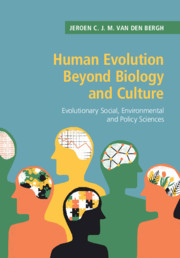Book contents
- Human Evolution Beyond Biology and Culture
- Human Evolution Beyond Biology and Culture
- Copyright page
- Contents
- Preface
- Part I Prevue
- Part II Evolutionary Biology
- Part III Bridging Natural and Social Sciences
- Part IV Evolutionary Social Sciences
- 7 Evolutionary Theories of Human Culture
- 8 Evolutionary Economics
- 9 Evolution of Organisations and Institutions
- 10 Technological Evolution
- Part V Evolutionary Cultural History
- Part VI Evolutionary Environmental and Policy Sciences
- References
- Index
- Plate Section (PDF Only)
8 - Evolutionary Economics
from Part IV - Evolutionary Social Sciences
Published online by Cambridge University Press: 28 September 2018
- Human Evolution Beyond Biology and Culture
- Human Evolution Beyond Biology and Culture
- Copyright page
- Contents
- Preface
- Part I Prevue
- Part II Evolutionary Biology
- Part III Bridging Natural and Social Sciences
- Part IV Evolutionary Social Sciences
- 7 Evolutionary Theories of Human Culture
- 8 Evolutionary Economics
- 9 Evolution of Organisations and Institutions
- 10 Technological Evolution
- Part V Evolutionary Cultural History
- Part VI Evolutionary Environmental and Policy Sciences
- References
- Index
- Plate Section (PDF Only)
Summary
- Type
- Chapter
- Information
- Human Evolution beyond Biology and CultureEvolutionary Social, Environmental and Policy Sciences, pp. 239 - 270Publisher: Cambridge University PressPrint publication year: 2018



